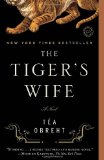Summary | Excerpt | Reviews | Beyond the book | Read-Alikes | Genres & Themes | Author Bio

A Novel
by Téa ObrehtWinner of the 2011 Orange Prize for Fiction!
Set in an unnamed Balkan country shortly after the end of civil war, The Tiger's Wife is, on the surface, a tale of one woman's search for the truth behind her beloved grandfather's death, but the implications of this search are fundamental to the way we make sense of life and death. Obreht's delicate unfolding of Natalia's grandfather's past presents a multi-dimensional view of a man Natalia believed she knew. From the reader's view, these different perspectives are suspended but never resolved, so that we are left with the final, breathless conclusion that they could all be true. The tantalizing notion that the fantastic and unbelievable can co-exist with the mundane has long fueled religion, fiction, and folklore. Obreht teases out the human impulse to create stories, to contrive wonder in the face of temporality, and the result is extraordinary.
Resonant of Yann Martel's The Life of Pi and Gabriel Garcia Marquez's One Hundred Years of Solitude, The Tiger's Wife rests at the intersection of reason and superstition, medicine and magic, death and immortality, truth and fiction. Natalia and her grandfather are physicians, schooled in the sensible solidity of science, but as Grandfather nears his end, he turns to superstition to make sense of death. Obreht suggests that "when confounded by the extremes of life - whether good or bad - people [will] turn first to superstition to find meaning, to stitch together unconnected events in order to understand what [is] happening." The impulse to tell a story, either to oneself or to others, is strong, but to Natalia, it seems surprising for a person like Grandfather, a man seemingly immune to this storytelling lure, to turn to stories rather than science to understand his death. As she begins her search for understanding, she is ushered into the shadows of her grandfather's childhood in a remote village, when a young, mute girl became the tiger's wife and changed Grandfather's life forever. What she discovers cements the notion that lessons imprinted in childhood are hard to escape and that sometimes the truth is best delivered through fable.
The brilliance of The Tiger's Wife lies in the way that the story is told. We hear the stories as Natalia hears them, complete with all their nuances, misinterpretations, and analyses. We listen in the village square as gossips wonder about disturbing events. We see how tales passed from person to person can morph, how reality can be blurred, how new plot lines can emerge. Fear, desperation, and agony play upon these stories, and we feel these impulses, too. In an isolated village with few educated villagers and a strong tradition of folklore, it becomes easy to see how certain key events could be misunderstood. Our own modern reliance on "fact" over "fiction" is rocked as Obreht forces us to evaluate the ways in which we make sense of the tales presented to us. In this way, she asks that we participate in the story-making, in Natalia's process of creating her grandfather's past. It is a brilliant achievement.
As with other works of great fiction, there is no conclusion. We are left at the end with our own thoughts. Perhaps these stories are true, or perhaps they were just desperate attempts to create whimsy in a tragic world. It is up to the reader to decide. What is made clear, however, is the beauty that is created, the love found, the hope composed to float us out of pain. Obreht's novel invites us into the heart of storytelling, but it also invites us into the places where death becomes beautiful, a young boy falls in love, and a mute girl escapes the tragedy of her life in the soft embrace of a tiger.
![]() This review
first ran in the March 24, 2011
issue of BookBrowse Recommends.
This review
first ran in the March 24, 2011
issue of BookBrowse Recommends.

If you liked The Tiger's Wife, try these:

by Isabel Allende
Published 2018
New York Times and worldwide bestselling "dazzling storyteller" (Associated Press) Isabel Allende returns with a sweeping novel about three very different people who are brought together in a mesmerizing story that journeys from present-day Brooklyn to Guatemala in the recent past to 1970s Chile and Brazil.

by Sara Novic
Published 2016
A powerful debut novel about a girl's coming of age—and how her sense of family, friendship, love, and belonging is profoundly shaped by war.
Your guide toexceptional books
BookBrowse seeks out and recommends the best in contemporary fiction and nonfiction—books that not only engage and entertain but also deepen our understanding of ourselves and the world around us.